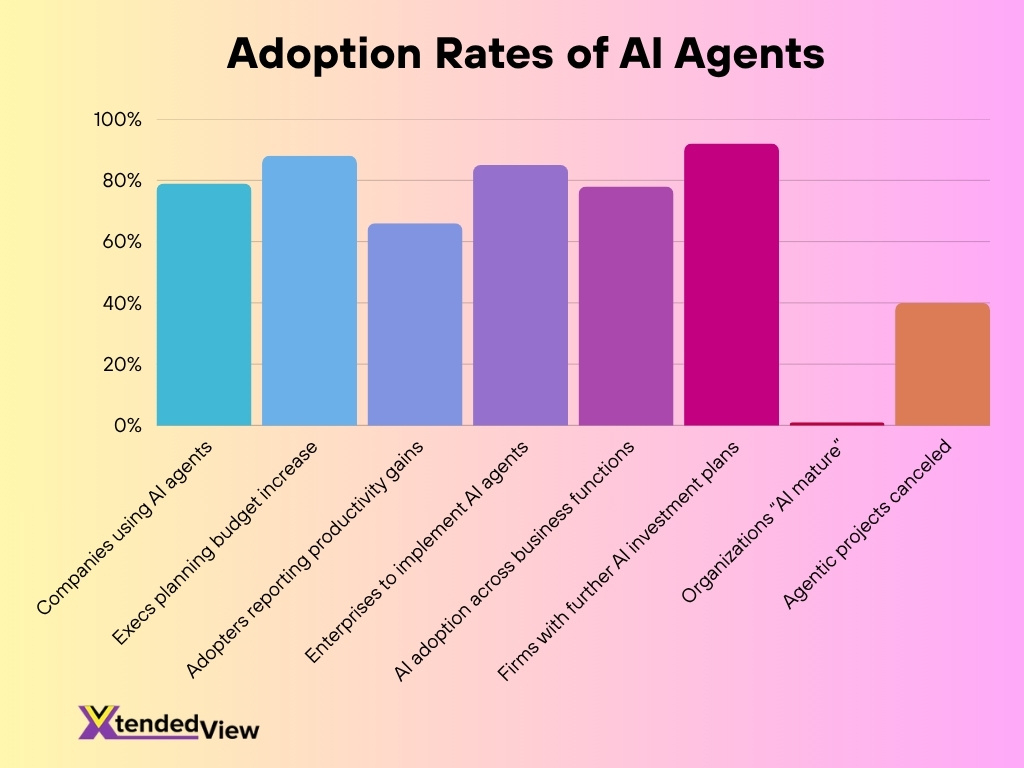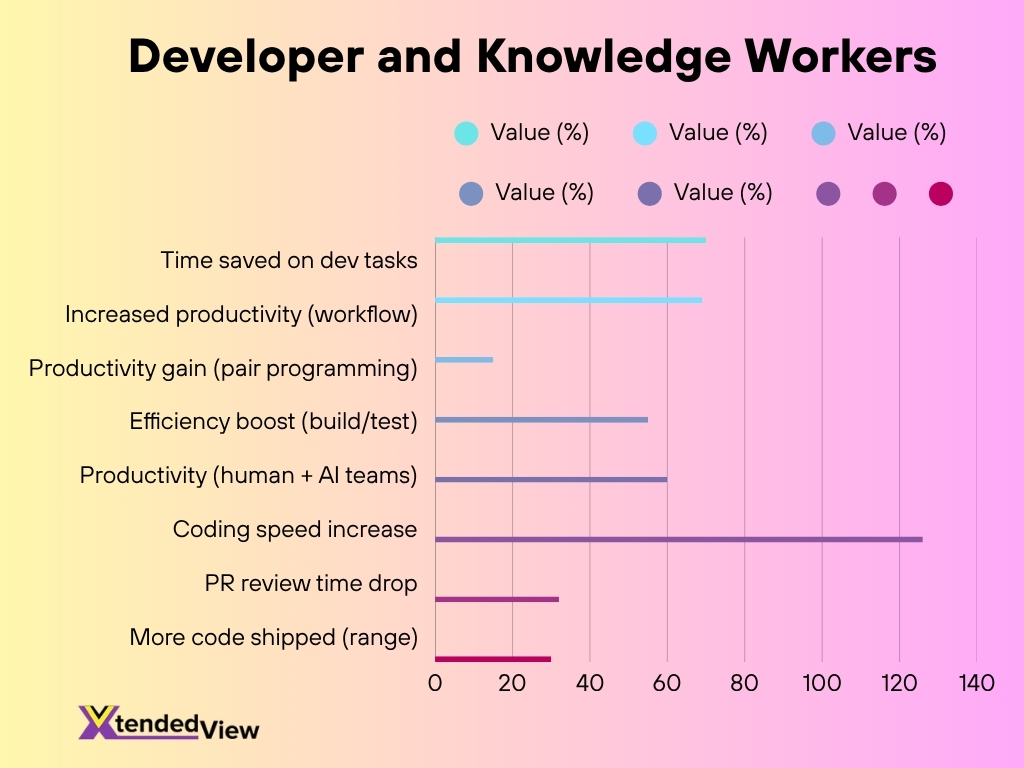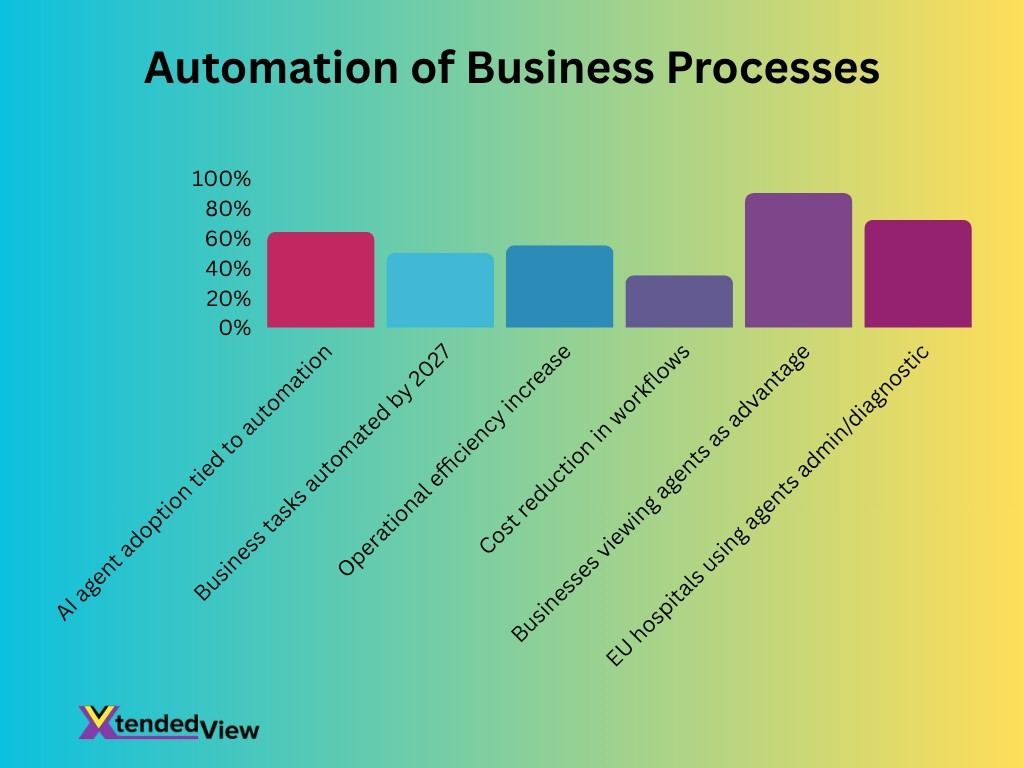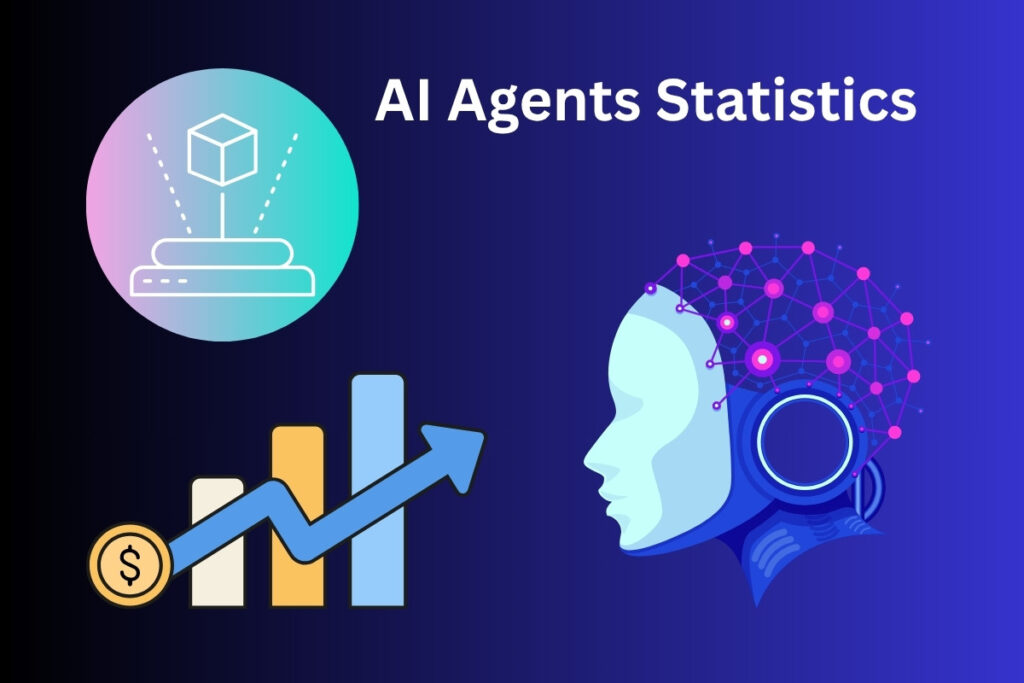Introduction
AI agents, autonomous software systems that plan, reason, and act, are shifting from theory into tangible business tools. Across industries, they’re enabling automated workflows, personalized interactions, and real‑time decisioning. In customer service, AI agents now manage routine inquiries, in healthcare, they assist with triage and scheduling. Read on to explore key stats, use cases, and emerging patterns transforming the AI agent landscape.
Editor’s Choice
Here are seven standout statistics that set the tone for 2025’s AI agent era:
- The global AI agent market is projected to reach USD 7.92 billion in 2025, up from USD 5.43 billion in 2024.
- CAGR from 2025 to 2034 is estimated at 45.82 %.
- 88 % of senior executives plan to increase AI-related budgets in the next 12 months.
- 79 % of surveyed companies already adopt AI agents in some capacity.
- 66 % of those adopters report measurable productivity gains.
- 85 % of enterprises are expected to implement AI agents by end‑2025 across at least one workflow.
- Gartner predicts over 40 % of “agentic AI” projects will be scrapped by 2027 due to unclear ROI.
Recent Developments
- AI agents are increasingly shifting focus from mere assistants to autonomous decision-makers driving workflows.
- The narrative in 2025 centers on agentic AI, not just large language models.
- Dozens of startups now market “agent platforms” rather than standalone chatbots.
- Some enterprises have begun deploying multi-agent systems, where agents coordinate toward higher-level goals.
- Analyst reports caution about “agent washing,” where systems are branded as agents even without true autonomy.
- More models now embed tool integration (APIs, databases, external services) to act on behalf of users.
- Research papers emphasize Agentic ROI, the balance of benefit vs cost in real-world agent deployment.
- Some legacy enterprise software suites are integrating built-in AI agents as modules.
AI Agents Market Size and Growth
- The market was USD 5.43 billion in 2024, rising to USD 7.92 billion in 2025.
- Alternate sources estimate USD 7.38 billion in 2025.
- CAGR from 2025 to 2030 is projected around 44.8 %.
- By 2034, forecasts target USD 236.03 billion in value.
- The U.S. share of the 2024 market was about 41 %.
- Asia‑Pacific is expected to register the fastest growth rate over the coming years.
- Single‑agent systems currently dominate (62.3 % share) in 2024.
- The ready‑to‑deploy agent segment holds 58.7 % share of product mix in 2024.
- Coding & software development agents are forecasted to grow fastest among roles.
Adoption Rates of AI Agents
- 79 % of companies in a May 2025 survey say they already use AI agents.
- 88 % of senior executives plan to boost AI budgets in the next year.
- 66 % of adopters report measurable productivity gains from AI agents.
- 85 % of enterprises are expected to implement AI agent workflows by year-end.
- Among broader AI adoption, 78 % of organizations now use AI in at least one business function.
- In one study, 92 % of firms intend further investment in AI over next 3 years.
- Only 1 % of organizations self‑report being “AI mature” (full integration).
- Gartner warns that over 40 % of agentic projects will be canceled by 2027 due to value uncertainty.

Enterprise and Industry Use Cases
- AI agents are increasingly applied in customer support, sales workflows, HR automation, and IT operations.
- Some firms automate repetitive finance tasks (e.g. reconciliations) using agents.
- In marketing, agents help personalize content delivery, campaign sequencing, and audience targeting.
- Supply chain and logistics use agentic systems to optimize routing, demand forecasting, and inventory management.
- Some insurers use agents to triage claims, validate documents, and escalate complex cases to humans.
- Energy and utility firms deploy agents for demand response, grid balancing, and predictive maintenance.
- In telecom, agents manage network health, resource allocation, and predictive failure detection.
- Retailers and e-commerce firms integrate agents for pricing, inventory alerts, and recommendation engines.
AI Agents in Customer Service
- 75 % of organizations report improved customer satisfaction post-agent deployment.
- Deployment of agents yields an average 6.7 % boost in CSAT where used.
- 128 % higher ROI in CX for early adopters compared to traditional approaches.
- Consumers’ willingness: 44 % would use AI agents for scheduling tasks, 24 % for shopping tasks.
- 70 % of consumers would use agents to manage loyalty points or price-drop alerts.
- 67 % of consumers trust “human‑like” AI interactions.
- By 2028, 68 % of customer interactions are expected to be handled autonomously via AI tools.
- In e-commerce, 65 % of online retailers already integrate agents into CRM for support.
Developer and Knowledge Worker Applications
- About 70 % of developers say AI agents reduce the time they spend on specific dev tasks.
- 69 % report increased productivity thanks to agent-assisted workflows.
- GitHub Copilot has over 15 million users worldwide.
- Benchmark tests show a coding speed jump of 126 % using AI tooling.
- A Cornell study found that engineers using pair‑programming assistants saw 15 % productivity gain.
- 55 %+ of developers report efficiency boosts during build/test cycles thanks to AI agents.
- In a year‑long field deployment of a combined code generation + review tool, PR review cycle time dropped by 31.8 %.
- The same study saw 30–40 % more code volume shipped, attributed to agent assistance.
- In controlled marketing/creative experiments, human + AI teams generated 60 % greater productivity per worker.

Productivity and Efficiency Improvements
- Among adopters of AI agents, 66 % report higher productivity.
- 57 % say they achieved cost savings, 55 % faster decision-making, and 54 % improved customer experience.
- Firms using AI agents report an average operational cost reduction of 22 % in the first year.
- Marketing teams see 31 % reduction in outsourcing costs.
- In IT departments, AI agents yield 18 % cost reduction.
- McKinsey estimates AI’s long‑term productivity upside at USD 4.4 trillion globally.
- In human + AI experiments, agents allowed humans to spend 23 % more time on content generation.
- These same experiments saw a 137 % increase in communication volume.
- Multi‑team deployment often shows diminishing returns.
Personalization and Customer Experience
- 54 % of organizations using AI agents report improved customer experience.
- Agents can drive 35 % faster lead conversion.
- In eCommerce, 65 % of retailers integrate agents into CRM for support.
- 88 % of customers prefer self-service before contacting a human.
- 54 % of consumers view brands more favorably when agents deliver fast, personalized responses.
- 72 % of CX leaders expect AI agents to act as brand representatives.
- Agent personality tuning improved ad performance (CTR, CPC).
- 80 % of firms use AI agents for copywriting, targeting, and campaign analytics.
- Early adopters report 128 % ROI in CX.
Cost Reduction and ROI
- Adopters report 22 % average first‑year cost reduction.
- Small businesses spending < USD 500/month on agents report 3.8× returns.
- 57 % cite cost savings as a primary benefit.
- Some early CX agents delivered 128 % ROI.
- Enterprises allocate 43 % of AI budgets to agentic AI.
- 62 % of firms expect ROI above 100 %.
- Gartner warns 40 %+ of agentic projects may be scrapped by 2027.
- 75 % of firms say they’re confident in their AI agent strategy.
- Only 5 % of companies derive measurable value from AI overall.
AI Agents in eCommerce and Retail
- The global AI-enabled eCommerce market size is USD 8.65 billion in 2025.
- Projected to hit USD 22.60 billion by 2032.
- 65 % of online retailers now integrate AI agents into CRM.
- AI agents drive dynamic pricing, inventory alerts, and personalized offers.
- Retailers report 30 % cost drops in support operations.
- Agents help in demand forecasting and supply chain orchestration.
- Brands enable 24/7 shopping via agents as assistants.
- Agents assist in returns handling and logistics queries.
- Recommendation engines increase average order value by 10–15 %.
AI Agents in Healthcare and Finance
- AI in healthcare is valued at USD 26.69 billion in 2024.
- Expected to grow to USD 613.81 billion by 2034.
- 81 % of healthcare adopters saw revenue increases, 50 %+ saw ROI within a year.
- AI in healthcare could save USD 150 billion annually.
- 90 % of hospitals to adopt AI agents by 2025.
- 70 % of financial institutions use agents for fraud detection and modeling.
- Agents reduce KYC review costs by 20–30 %.
- Lower false positives improve customer experience.
- Agentic models have replaced hundreds of support roles in fintech.
Automation of Business Processes
- 64 % of AI agent adoption is tied to automation.
- AI agents may automate 15–50 % of business tasks by 2027.
- Firms report 55 % higher operational efficiency.
- 35 % cost reductions seen in automated workflows.
- 90 % of businesses view agents as a competitive advantage.
- 72 % of EU hospitals employ agents for admin/diagnostic tasks.
- Tasks include procurement, claims, onboarding.
- Agent orchestration is critical as scale increases.
- Over‑automation risk can degrade performance.

Human‑AI Collaboration Trends
- 40 % of U.S. employees say they use AI at work, up from 20 % in 2023.
- 78 % of organizations used AI in 2024, up from 55 % in 2023.
- 92 % of companies plan to increase AI investment, yet only 1 % call themselves AI mature.
- 82 % of leaders believe AI will change their industry in 24 months.
- Human + AI agent hybrid models are standardizing.
- AI agents free 20–25 % of human time for higher-level work.
- Collaboration platforms now embed agent access.
- Over 70 % of QA effort targets deterministic modules, < 5 % tests neural planning parts.
- Decentralized governance models (blockchain) are emerging.
Key Challenges and Barriers to Adoption
- Governance, trust, compliance, and privacy are top concerns.
- 40 %+ of projects may be scrapped due to unclear ROI.
- “Agent washing” causes market confusion.
- Large firms show slowing adoption.
- Non-deterministic agent behavior is hard to test.
- Operational risks from unauthorized actions exist.
- Generic agents struggle in regulated industries.
- Staff fear and lack of training block adoption.
Trust, Oversight, and Governance
- AI governance market valued at USD 309M in 2025, rising to USD 4.83B by 2034.
- Second-opinion audits and oversight layers are standardizing.
- Token-based decentralized governance proposed.
- Global regulation frameworks diverge.
- EU AI Act mandates transparency and accountability.
- Governance addresses agent drift and access control.
- Explainability is difficult but critical.
- Insurance and audit trails assign accountability.
Regional and Global Market Trends
- 2025 market estimates range USD 5.1B–7.6B.
- Projected to hit USD 42–47B by 2030.
- RootsAnalysis predicts USD 220.9B by 2035.
- North America leads, Asia-Pacific grows fastest.
- U.S. promotes innovation, EU regulates, Asia state-led.
- Agentic Web may host 1.3B agents by 2028.
- Global standards and interoperability efforts underway.
Agent Types and Deployment Models
- Types include task, multi-agent, meta-agents, orchestrators.
- Deployment options: cloud, edge, hybrid.
- On-device agents preserve privacy.
- Central orchestration is growing.
- Tool-integrated agents are more capable.
- Open vs proprietary trade-offs impact extensibility.
- Multi-agent collaboration is expanding.
- Reward models enable agent learning.
- Deployment includes versioning, governance, rollback.
Future Trends and Market Forecast
- Market may hit USD 42B–47B by 2030.
- Could exceed USD 200B by 2035.
- 15 % of business decisions may be handled by agents by 2028.
- Agents will embed into core business systems.
- Agent marketplaces and exchanges are expected.
- Causal, explainable, and adaptive agents will win.
- Web3 may power decentralized agents.
- Cross-company collaboration will emerge.
- Many projects risk abandonment without value clarity.
Frequently Asked Questions (FAQs)
The market is estimated at USD 7.38 billion in 2025.
The compound annual growth rate is about 45.82 % over that period.
Around 79 % of companies report adopting AI agents.
Approximately 66 % of adopters confirm measurable productivity improvements.
More than 40 % of agentic AI projects may be scrapped by 2027.
Conclusion
AI agents in 2025 sit at a pivotal crossroads. From surging adoption and compelling business cases to unresolved trust, orchestration, and governance issues, their promise is real, but not risk‑free. Across industries, hybrid human‑AI collaboration is becoming the norm rather than the exception. Enterprise leaders who pair bold deployment with robust oversight, domain expertise, and clear ROI planning will likely emerge ahead. The journey from experimentation to scaled value is underway, stay tuned as agents evolve into critical infrastructure, not just cool tools.


